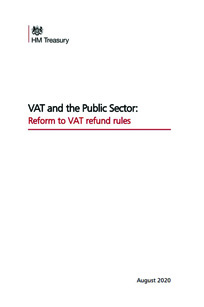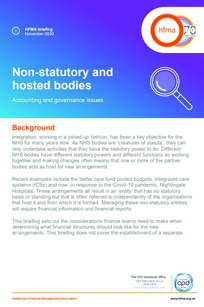Technical review – December 2020
The introduction of the international financial reporting standard on leasing – IFRS 16 – has been deferred for the Department of Health and Social Care and the NHS until 1 April 2022. The standard was originally published in 2015 and was adopted by companies (including NHS companies and community health partnerships) in 2019/20. The NHS was due to adopt the standard from April 2020, but this was deferred earlier this year in the face of the Covid-19 pandemic to reduce the burden around the year-end. Given the service now faces a challenging winter as it meets the second wave of the virus - this time running more non-Covid services in parallel - the requirement for compliance with the standard has now been deferred a further year. NHS England and NHS Improvement requested the additional delay to recognise the pressures facing the NHS and finance teams and the Treasury and the Financial Reporting Advisory Board have both agreed. At the end of November, the Treasury was still to decide what this meant for the wider public sector in terms of implementation dates. Application guidance was for the standard was published by the Treasury in December 2019.
 The HFMA last month welcomed plans to reform the VAT refund system but would need careful planning and implementation. In particular, the association warned that the aim for the changes to fiscally neutral should also apply at other levels in the system. Alternatively, the impact of the change on an individual body’s financial position would need to be recognised as outside its control, the HFMA said. NHS bodies cannot currently recover VAT incurred delivering most no-business activities, which includes the delivery of healthcare. However, they can recover VAT on a limited list of services, covered by section 41 of the VAT Act 1994. The Treasury recognises that the current system is overly complex and not fit for purpose and proposes the adoption of a full refund model. VAT would be recoverable on all goods and services used in non-business activities and the Department of Health and Social Care’s expenditure limit would be reduced to reflect this reduction in cost. The HFMA response also highlighted the importance of timing, with managers needing at least one planning round to implement the changes.
The HFMA last month welcomed plans to reform the VAT refund system but would need careful planning and implementation. In particular, the association warned that the aim for the changes to fiscally neutral should also apply at other levels in the system. Alternatively, the impact of the change on an individual body’s financial position would need to be recognised as outside its control, the HFMA said. NHS bodies cannot currently recover VAT incurred delivering most no-business activities, which includes the delivery of healthcare. However, they can recover VAT on a limited list of services, covered by section 41 of the VAT Act 1994. The Treasury recognises that the current system is overly complex and not fit for purpose and proposes the adoption of a full refund model. VAT would be recoverable on all goods and services used in non-business activities and the Department of Health and Social Care’s expenditure limit would be reduced to reflect this reduction in cost. The HFMA response also highlighted the importance of timing, with managers needing at least one planning round to implement the changes.
Audit Wales has published the 2020 version of the Code of audit practice. The document, which replaces the 2018 version, takes account of changes in terminology that have occurred since the previous code was published and reflects the commitment the auditor general made to the Senedd’s finance committee to consider annually whether to update the code. None of the changes made to the code are considered to be substantive, meaning the code did not require further consultation.
 A new briefing from the HFMA – Non-statutory and hosted bodies: accounting and governance issues – explores the considerations finance teams need to make when determining the financial structures to use for non-statutory entities. With the move to system working, local health economies are increasingly working in a joined-up fashion. However, while these partnership entities require financial information and financial reports to support management, they have no statutory basis and cannot enter into financial transactions themselves. The briefing looks the use of hosting arrangements, such as those adopted for the Nightingale hospitals, and a consolidation approach. This involves each entity accounting for its own transactions, with a consolidated statement then produced for management purposes. A blended approach may also be used in some cases. The briefing considers the governance implications and common accounting policies.
A new briefing from the HFMA – Non-statutory and hosted bodies: accounting and governance issues – explores the considerations finance teams need to make when determining the financial structures to use for non-statutory entities. With the move to system working, local health economies are increasingly working in a joined-up fashion. However, while these partnership entities require financial information and financial reports to support management, they have no statutory basis and cannot enter into financial transactions themselves. The briefing looks the use of hosting arrangements, such as those adopted for the Nightingale hospitals, and a consolidation approach. This involves each entity accounting for its own transactions, with a consolidated statement then produced for management purposes. A blended approach may also be used in some cases. The briefing considers the governance implications and common accounting policies.
In October, HM Revenue and Customs provided an update on recent litigation on the VAT treatment of car leasing schemes using salary sacrifice arrangements. The update followed the Court of Appeal ruling that an NHS trust was entitled to claim a refund of VAT incurred. The court confirmed that the provision of cars to employees under salary sacrifice arrangements did not amount to economic activity and so VAT could be reclaimed. HMRC has accepted the decision and the litigation has concluded.
The National Audit Office has issued guidance on auditors’ work on value-for-money (VFM) arrangements. The guidance sets out how auditors are expected to approach and report on their VFM work under the new Code of audit practice. The code came into effect on 1 April and applies to audits of 2020/21 financial statements. The guidance sets out to promote more timely reporting of significant issues; provide more meaningful and accessible annual reporting on VFM arrangements in key areas; give sharper reporting on financial sustainability, governance and improving economy, efficiency and effectiveness; and provide clearer recommendations to help local bodies improve their arrangements. The document offers more detail on the commentary on arrangements to secure VFM – a key output of local audit work from 2020/21 audits.
Significant changes could be made to the arrangements for contracting and paying for low volume flows of activity between clinical commissioning groups and providers from April next year, under proposals by NHS England and NHS Improvement at the end of November. The changes, which will largely affect non-contract activity (NCA), would embed the short-term simplification introduced for 2020/21 in response to the Covid pandemic. Under previous arrangements, invoices with a value of less than £10,000 account for 82% of total trust-to-CCG invoices by number, but only 1% by total value. Instead trusts would build invoicing for NCA into existing contractual arrangements with their co-ordinating commissioner – reducing the number of invoices by around 340,000 in a full year.
Related content
The value masterclass shares examples of organisations and systems that have pursued a value-driven approach and the results they have achieved.
This webinar series offers colleagues of ICS organisations the opportunity to discuss common priorities, challenges, and successes within their field.